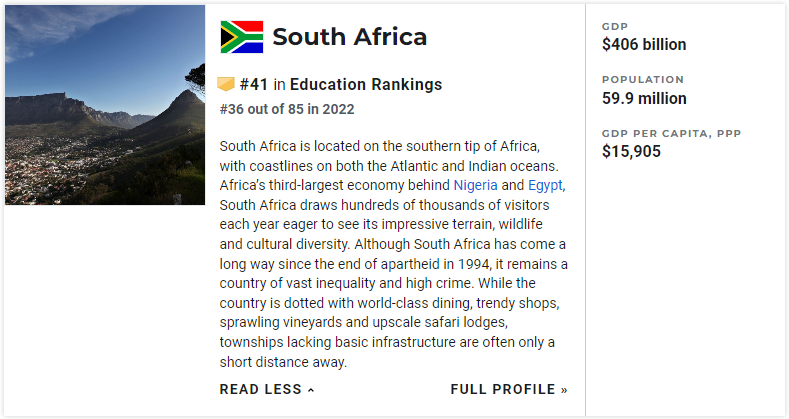“Education is the most powerful weapon which you can use to change the world.” — Nelson Mandela
#41 – South Africa’s Education Ranking
South Africa’s Education Ranking is #41 in 2023, it went down from #36 in 2022.
The annual Best Countries Report, a collaboration between US News and World Report, BAV Group, and the Wharton School of the University of Pennsylvania, is a comprehensive survey encompassing 78 countries. Utilizing responses from thousands of individuals, the report ranks countries based on various attributes. When evaluating the education sector, the survey considers three equally-weighted factors: a well-developed public education system, the inclination to pursue higher education in the country, and the provision of high-quality education. The current iteration of the report, as of 2023, identifies the top ten countries for education based on these rankings.
#1 – US Education Ranking
The United States has the best education system in the world. A significant number of international students, totaling 1,057,000, have been enrolled in universities in the USA last year. Education in the United States includes early childhood education, primary and secondary education, and higher education.
The American High School Diploma (matric with exemption) or the GED (matric without exemption) are very popular school exits for many homeschoolers in South Africa. Many of us prefer to use the US national curriculum because it is very homeschool-friendly and offers a plethora of homeschool curricula (book based or online), curriculum service providers, and a high variety of parent-led or accredited online schools to choose from.
Education Rates of Children Around the World
One of the most reviewed studies for the education rates of children around the world involved 470,000 fifteen-year-old students. The students undertook tests in math, science, and reading, similar to standardized college admission exams in the US. The study’s findings revealed the average scores for each subject in different countries. China achieved the highest scores, followed by Korea, Finland, Hong Kong, Singapore, Canada, New Zealand, Japan, Australia, and the Netherlands.
South Africa’s Literacy Rate is 90%
According to this study, South Africa’s Literacy Rate is 90% . Education rankings are sourced from both the annual UN News Best Countries report and the nonprofit organization World Top 20. For results see Literacy Rate by The World Bank.
#114 – South Africa’s Ranking on the International Education Database
The purpose of the international education database is to measure and rank the impact of each nation’s education system on its economic and social environment. South Africa’s ranking is #114 in 2024.
The education system plays a pivotal role in shaping not only individuals but also the entire fabric of society. Its influence permeates through every aspect of our lives, informing our understanding of the world and our place within it. Every education system, with its distinctive characteristics, holds a tapestry of advantages and drawbacks. As it evolves, it reflects the social, economic, and cultural circumstances unique to each country and community. This intricate interplay between education and society underscores the dynamic nature of human development.
At the heart of each education system lies a complex interweaving of traditions, values, and priorities. These intricacies are woven into the very fabric of education, shaping the way individuals perceive knowledge and learning. The structure and content of education curricula are influenced by historical legacies, societal norms, and the prevailing economic climate. Therefore, the education system not only imparts knowledge but also serves as a mirror, reflecting the multifaceted essence of the respective communities and countries.
These reflections encapsulate the intricate relationship between education systems and the societies they serve. It is an ever-evolving ecosystem, shaped by historical legacies, societal needs, and the aspirations of future generations. Therefore, understanding the nuances of each education system is vital in fostering a holistic view of its impact on individuals and society as a whole.








Commentaires